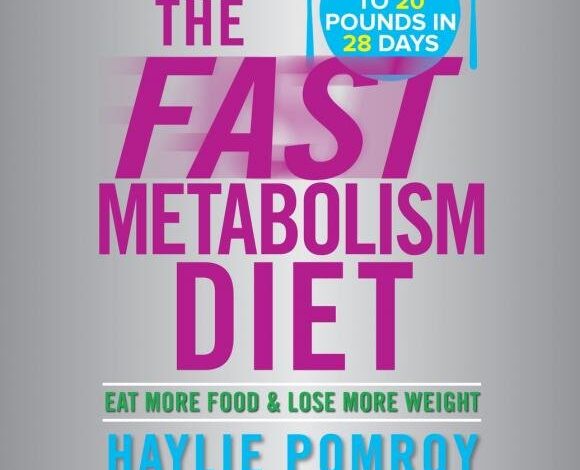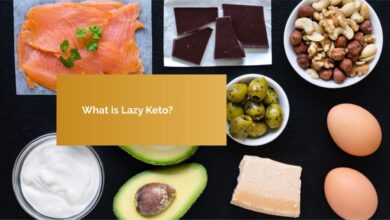
The Science Behind Metabolism and Weight Loss
Introduction
- What is metabolism?
- The importance of understanding metabolism in relation to weight loss
- How metabolism impacts the body’s ability to burn fat and lose weight
Understanding Metabolism
- What is metabolism?
- The metabolic rate: Basal Metabolic Rate (BMR)
- Types of metabolism: Fast, slow, and how they affect weight loss
- How metabolism influences energy expenditure
The Role of Calories in Weight Loss
- How calories are burned by the body
- The concept of a calorie deficit and how it aids in weight loss
- The importance of balance between calories consumed and calories burned
Factors That Affect Metabolism
- Genetics and metabolism: How much of it is inherited?
- Age and metabolism: Why metabolism slows down with age
- Hormones and their impact on metabolism
- Gender and metabolism: How men and women differ
- Sleep and metabolism: The relationship between sleep and metabolic rate
Basal Metabolic Rate (BMR) and Weight Loss
- Understanding BMR: The energy required for basic body functions
- How BMR affects weight loss efforts
- Ways to increase your BMR
- Strength training and muscle mass
- High-intensity interval training (HIIT)
- The impact of diet on BMR
How Food Affects Metabolism
- The thermic effect of food (TEF)
- Protein and metabolism: How protein increases calorie burn
- Healthy fats and their role in metabolism
- Carbohydrates and how they affect metabolic processes
- The role of meal timing in boosting metabolism
Exercise and Metabolism
- How exercise boosts metabolic rate
- Cardio vs. strength training: Which is better for metabolism?
- The role of physical activity in maintaining metabolism
- Exercise and its long-term effects on metabolism
The Impact of Diet on Metabolism
- Foods that boost metabolism naturally
- Green tea
- Chili peppers
- Protein-rich foods
- The effect of calorie restriction on metabolism
- Eating for optimal metabolic function
Common Myths About Metabolism and Weight Loss
- Myth 1: “Metabolism is all about genetics.”
- Myth 2: “You can’t lose weight if you have a slow metabolism.”
- Myth 3: “Starving yourself will speed up your metabolism.”
How to Optimize Your Metabolism for Weight Loss
- Practical tips to speed up your metabolism
- Increasing physical activity
- Eating a balanced diet with the right nutrients
- Getting enough sleep
- Managing stress levels
- Metabolism-boosting foods to add to your diet
- Lean proteins
- Whole grains
- Healthy fats like avocado and olive oil
The Relationship Between Metabolism and Weight Loss Plateaus
- What happens when weight loss stalls?
- The science behind weight loss plateaus
- How to overcome a weight loss plateau
- Changing your workout routine
- Adjusting your diet
- Ensuring proper hydration
The Importance of a Sustainable Approach to Metabolism and Weight Loss
- Long-term strategies for maintaining a healthy metabolism
- Avoiding drastic diets or quick fixes that harm metabolism
- Building healthy habits for sustainable weight loss
Conclusion
- Recap of key points about metabolism and weight loss
- Final thoughts on understanding your metabolism for effective weight loss
FAQs
- How can I naturally speed up my metabolism?
- Is it possible to increase my metabolism after a certain age?
- How much of my metabolism is influenced by genetics?
- Can exercise alone help me lose weight without changing my diet?
- How does sleep impact my metabolism?
The Science Behind Metabolism and Weight Loss
When it comes to weight loss, understanding metabolism is key. It’s not just about cutting calories or increasing exercise—it’s about how your body processes and uses energy. In this article, we’ll explore the science behind metabolism, how it affects weight loss, and how you can optimize your metabolism to help you shed those extra pounds.
Introduction
Metabolism is a term that gets thrown around a lot when it comes to weight loss. It’s often used to explain why some people seem to lose weight easily while others struggle, even when following the same diet and exercise plans. But what is metabolism, really?
Simply put, metabolism is the process by which your body converts the food you eat into energy. This process involves a series of chemical reactions that convert calories into the energy needed to support everything from breathing and digestion to physical activity and brain function. Your metabolic rate determines how efficiently your body burns calories, which directly impacts your ability to lose or gain weight.
In this post, we’ll dive deep into the science of metabolism, explore how it impacts weight loss, and give you practical tips on how to rev up your metabolism to help you achieve your weight loss goals.
Read Also; “The Best Weight Loss Apps to Track Your Progress”
Understanding Metabolism
What is Metabolism?
Metabolism is the process by which your body breaks down food and converts it into energy. This energy fuels everything your body does, from breathing to moving. It’s the way your body produces the energy it needs to perform essential functions and physical activities.
Your metabolism works 24/7, even while you’re resting. This is why your body continues to burn calories even when you’re not actively exercising. How efficiently your body carries out these processes is influenced by several factors, including genetics, age, and lifestyle choices.
The Metabolic Rate: Basal Metabolic Rate (BMR)
Your basal metabolic rate (BMR) refers to the number of calories your body needs to perform basic life-sustaining functions, such as breathing, circulating blood, and regulating body temperature. This is the energy your body requires at rest.
BMR is the largest contributor to your total calorie expenditure—up to 70% of the calories you burn each day. The higher your BMR, the more calories your body burns at rest, making it easier to lose weight.
Types of Metabolism: Fast, Slow, and How They Affect Weight Loss
People often talk about having a “fast” or “slow” metabolism. While it’s true that some people may have naturally faster metabolisms, this doesn’t mean that weight loss is impossible for those with slower metabolisms. The key is understanding how your metabolism works and how you can optimize it.
- Fast metabolism: People with a fast metabolism tend to burn calories more efficiently and quickly, making it easier for them to lose weight or maintain a healthy weight.
- Slow metabolism: People with a slow metabolism burn calories at a slower rate. This can make weight loss more challenging, but it’s not impossible. With the right diet and exercise plan, it’s possible to boost your metabolism and shed excess pounds.
How Metabolism Influences Energy Expenditure
Your metabolism determines how efficiently your body uses energy from food. A higher metabolic rate means your body will burn calories more efficiently, even when you’re resting. Conversely, a slower metabolism means fewer calories burned throughout the day, which can lead to weight gain if you don’t balance your calorie intake and expenditure.
The Role of Calories in Weight Loss
Calories are units of energy that your body gets from food. When you consume more calories than your body burns, the excess is stored as fat. Conversely, when you burn more calories than you consume, your body begins to use stored fat as energy, leading to weight loss.
To lose weight, you need to be in a calorie deficit, meaning you burn more calories than you consume. This is where understanding metabolism becomes crucial. A faster metabolism helps you burn more calories throughout the day, making it easier to maintain a calorie deficit.
Factors That Affect Metabolism
Genetics and Metabolism: How Much of It is Inherited?
Your genetic makeup plays a significant role in your metabolism. Some people are naturally predisposed to having a faster metabolism due to their genes. However, just because you may have inherited a slower metabolism doesn’t mean you’re stuck with it. Lifestyle factors like diet, exercise, and sleep can help you boost your metabolism.
Age and Metabolism: Why Metabolism Slows Down with Age
As we age, our metabolism naturally slows down. This is largely due to the loss of muscle mass, which reduces the number of calories your body burns at rest. After the age of 30, most people experience a gradual decrease in metabolic rate, which can contribute to weight gain if not managed properly.
Hormones and Their Impact on Metabolism
Hormones play a key role in regulating metabolism. For instance, thyroid hormones influence the speed at which your body burns calories. Conditions like hypothyroidism (underactive thyroid) can lead to a slower metabolism, making it harder to lose weight. Hormones like cortisol (stress hormone) and insulin also affect fat storage and metabolism.
Gender and Metabolism: How Men and Women Differ
Generally, men tend to have a higher metabolic rate than women, primarily due to having more muscle mass. Muscle tissue burns more calories than fat tissue, which is why men often burn calories more efficiently. However, women can still boost their metabolism by building muscle through strength training.
Sleep and Metabolism: The Relationship Between Sleep and Metabolic Rate
Sleep is essential for proper metabolic function. Poor sleep can disrupt hormone regulation, leading to increased hunger and cravings, which can affect your calorie intake. Getting enough sleep each night helps regulate hormones like ghrelin (hunger hormone) and leptin (satiety hormone), supporting weight loss efforts.
Basal Metabolic Rate (BMR) and Weight Loss
Understanding BMR: The Energy Required for Basic Body Functions
Your BMR accounts for the largest portion of your daily calorie expenditure. It’s the energy your body needs to maintain basic life functions like breathing, digesting food, and circulating blood. The higher your BMR, the more calories your body burns at rest, which helps you lose weight more easily.
How BMR Affects Weight Loss Efforts
If you have a higher BMR, you can eat more without gaining weight. This is why individuals with a faster metabolism can often eat more calories and still maintain or lose weight. On the other hand, a slower BMR means fewer calories burned, making it harder to stay in a calorie deficit.
Ways to Increase Your BMR
- Strength training and muscle mass: Building muscle increases BMR because muscle burns more calories than fat, even at rest.
- High-intensity interval training (HIIT): HIIT has been shown to increase calorie burn both during and after exercise, helping to boost metabolism.
- Eating protein: Eating foods high in protein boosts BMR because the body uses more energy to digest protein than carbs or fats.
How Food Affects Metabolism
The Thermic Effect of Food (TEF)
TEF refers to the energy required to digest, absorb, and metabolize food. Protein has a high thermic effect compared to fats and carbs, meaning it helps boost metabolism. Eating protein-rich meals can increase your metabolism for several hours after digestion.
Protein and Metabolism: How Protein Increases Calorie Burn
Eating protein-rich foods boosts your metabolism because the body requires more energy to break down protein than it does for fats or carbohydrates. Including lean protein sources like chicken, fish, and tofu in your meals can help increase calorie burn and promote weight loss.
Healthy Fats and Their Role in Metabolism
Healthy fats, like those found in avocados, olive oil, and nuts, can help boost metabolism and keep you feeling full longer. Fatty acids from these sources support fat oxidation, which aids in fat burning.
Carbohydrates and How They Affect Metabolic Processes
Carbohydrates are the body’s main source of energy, but not all carbs are created equal. Complex carbs like whole grains are digested more slowly, helping to stabilize blood sugar levels and provide sustained energy. Simple carbs, on the other hand, can cause spikes and crashes in blood sugar levels, making them less ideal for weight loss.
Conclusion
Understanding how metabolism works is crucial for effective weight loss. By optimizing your metabolism through a balanced diet, regular exercise, and healthy lifestyle choices, you can create a sustainable approach to weight management. Remember that metabolism is not just about burning calories—it’s about supporting overall health and creating habits that work for you.
Read Also; “How to Maintain Weight Loss: Tips for Long-Term Success”
FAQs https://en.wikipedia.org/wiki/FAQ
How can I naturally speed up my metabolism?
You can naturally speed up your metabolism by building muscle, engaging in regular physical activity (especially HIIT), eating protein-rich foods, and getting enough sleep.
Is it possible to increase my metabolism after a certain age?
Yes, while metabolism naturally slows with age, you can still increase it by staying active, focusing on strength training, eating a balanced diet, and prioritizing sleep.
How much of my metabolism is influenced by genetics?
Genetics plays a role in metabolism, but lifestyle factors such as diet, exercise, and sleep have a more significant impact on your metabolic rate.
Can exercise alone help me lose weight without changing my diet?
Exercise is essential for weight loss, but without a proper diet, it can be challenging to achieve sustainable results. A balanced approach that includes both exercise and diet is most effective.
How does sleep impact my metabolism?
Sleep regulates hormones like ghrelin and leptin, which control hunger and satiety. Lack of sleep can lead to increased hunger and slower metabolism, making weight loss more difficult.






One Comment